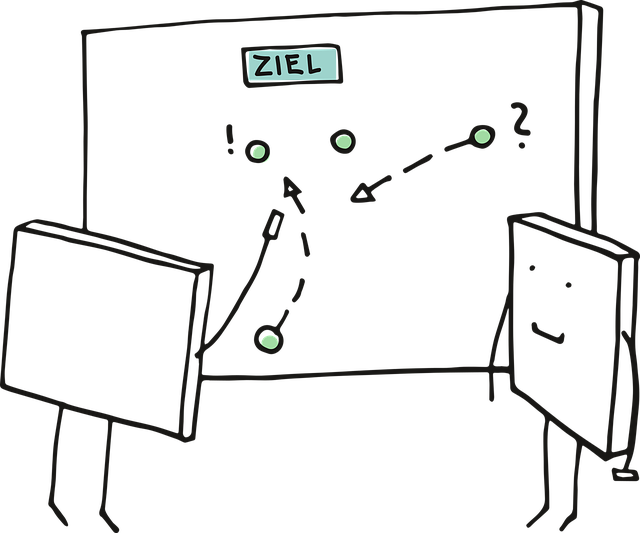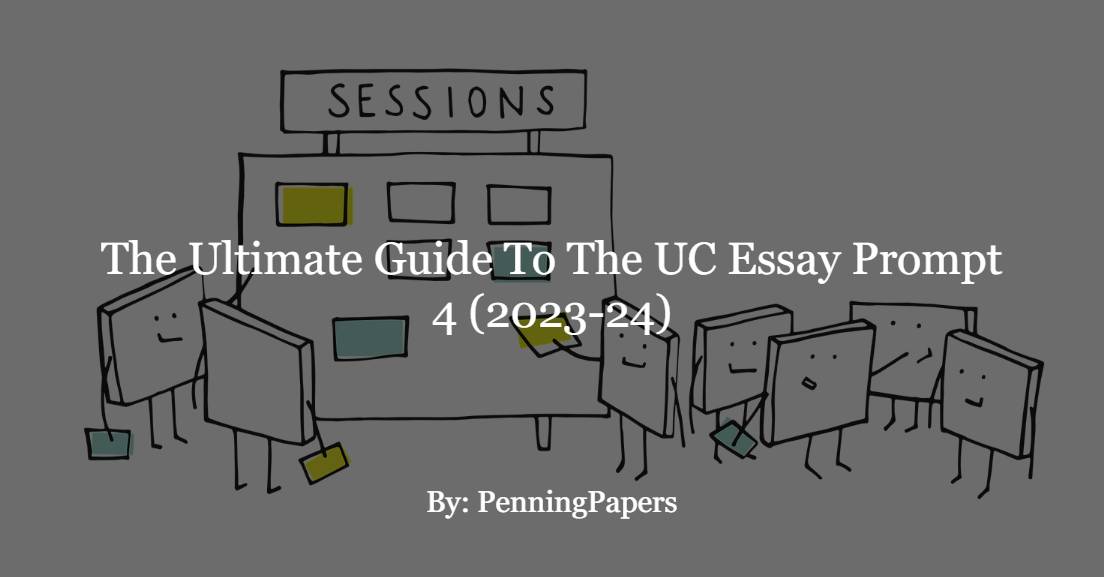Note: This guide is part of a series of 8 other guides on the best ways to answer the UC PIQ prompts. You can check it out here.
If you already know what you want to major in at university, the UC essay prompt 4 will give you a major advantage.
This is your opportunity to show you’re a step ahead.
Admissions officers will see your dedication to your intended major, and value the grit and determination you have to pursue it without being wishy-washy.
However, if you’re uncertain about your future career path or wish to be undeclared in your major, that’s okay! You can still answer UC essay prompt 4!
UC schools —and realistically any school for that matter— don’t mind their students spending their first few years of undergrad figuring things out. In fact, they encourage students to take a salad of classes to figure out what they want to major in. But, it’s those with a clear intended major who will earn extra brownie points from admissions officers (so long as you’re not naively confident!)
Whether you know your major or not, this article will serve as a guide to help students looking to write the UC essay prompt 4 correctly.
So, let’s get started!
Table of Contents
Professional College Application Help.
Contact us. We'll get to you within 24 hours.
How to Answer UC Essay Prompt 4.

Here’s the UC Essay Prompt 4.
We’ll also break down some of the major considerations you need to keep in mind.
“Describe how you have taken advantage of a significant educational opportunity or worked to overcome an educational barrier you have faced.” (350 words)
“An educational opportunity can be anything that has added value to your educational experience and better prepared you for college. For example, participation in an honors or academic enrichment program, or enrollment in an academy that’s geared toward an occupation or a major, or taking advanced courses that interest you — just to name a few.”
–UC Personal Insight Question 4
The keyword here is “or.”
You get to choose to write about EITHER an educational opportunity OR an educational barrier. So don’t worry: you’re not writing two prompts in 350 words or fewer.
There’s no discrimination. Admissions officers will NOT prefer you answer one or the other.
Just pick one.
In addition, the prompt asks specifically for experiences in education. This includes anything in school work, competitions related to academic subjects, and all projects related to the academic subjects in your school.
As a final point, you may want to consider whether to write about the educational barrier depending on if you’ve already written an essay for UC PIQ 5.
PIQ 5 already asks about an obstacle you faced and how you worked to overcome it. So, discussing an educational barrier may be repetitive. It may be advantageous in that case, therefore, to write about an opportunity you took.
Ultimately, whether you choose to write about an educational opportunity or barrier is up to you. There is no right or wrong answer. But, if you need help choosing, you may want to consider speaking with us over a free consultation! We can help guide you through the UC PIQ writing process, including which choices to choose.
How to Write the UC Educational Opportunity Essay.

That’s the thing: hyper-specific details with no context raise questions, and questions are exactly what will make admissions officers interested.
This section covers how to answer the UC essay prompt 4 if you’re writing about a significant educational opportunity.
First, let’s cover the opening.
Take the most interesting story about your subject. Did you learn something cool? Maybe you first discovered the beauty of Biology in a competition. Take the biggest climax of that event. Then, explain it and remove just a little bit of context.
Why out of context you may ask?
Well, everyone reading the UC essay prompt 4 essays is going to hear a million stories about why their subject is the best. History is great. Math is beautiful. Writing is full of passion.
Everyone has their reasons. But, these reasons get boring after reading a million essays.
The goal here is to capture the reader’s attention. To do that, you need to leave readers with more questions than answers (in a good way). Making the most interesting part of your story out of context keeps the essay vague enough to entice admissions officers.
You can read more about writing college essay intros in our other article here.
If the experience you’re talking about is academic, great. Suppose it’s correlated with your intended major. Even better!
Side Note: Don’t say you’re majoring in one field in the essay and put another subject in the application. Inputting conflicting information only serves to confuse admissions officers at best; at worst, admissions officers may think you’re trying to game the system.
There are also two main points to focus on.
- what you learned
- what you did/planned as a result.
So in total, you’ve got two main parts to the UC essay prompt 4 if you’re writing about educational opportunities.
- A tastefully interesting but out-of-context intro.
- The thing you learned and what action took place as a result.
This format will help keep your application interesting, preventing it from sounding stale.
Remember: educational opportunities are great and all. But, it’s a topic that can easily sound boring if you’re not careful with your phrasing. Be sporadic, and be exciting!
“I wanted to go above and beyond my known realm, so I took AP Statistics to better my mathematics skills for my future in business. It was challenging.”
Boring Example
Great! Except you sound like the rest of the thousands of students applying to UC schools.
How about something like this?
“I’ve had the same recurring dream every night: I’m standing at my desk and looking out the window of my building to watch the moving cars, the walking people, and flashing street lights only to think to myself, “I’ve made it, this is it.” I haven’t yet, though. I’m still here, in a chair two sizes too small, trying to balance a Chromebook twice the size of my desk.”
Interesting Example
Take a look at the second intro.
We can infer the writer desires to be the boss of their own company. But, what kind?
They have to take a class, but their chairs and desks are too small; they must be a low-income applicant.
Why are they equipped with Chromebooks in a low-income school?
What class is it anyway?
The key is to be very specific, so much so that it demands context to understand the full story: context that you will withhold from sharing, and only putting it in the body paragraphs to entice readers to continue.
Now, let’s talk about the second section: content you learned from your experience and what you wish to do with your knowledge for your future plans.
Make sure to segregate your paragraphs accordingly. By doing so, you can add an invisible gap between the experience and the result. This helps with readability and helps admissions officers compartmentalize the content they’re reading.
Take a look at the example below.
“I couldn’t believe, after so much effort, that I had mastered my journalism skills to such a degree. Years of hammering down my craft have made my writing completely different from before. It is with that that I plan to pursue a career in journalism in the future, as I believe there is still much to be done about spreading the news and well… ”
Bad
“I couldn’t believe, after so much effort, that I had mastered my journalism skills to such a degree. Years of hammering down my craft have made my writing completely different from before.
It is with that that I plan to pursue a career in journalism in the future, as I believe there is still much to be done about spreading the news and well… ”
Good
Separate the thing that you learned from the action you took into separate paragraphs. They become their own entities, making the flow of the essay smoother.
To conclude, here’s how you should format the UC essay prompt 4 essay
- Take the most interesting (climax) part of your education experience that you want to talk about. Specify details to the best of your ability. Make it specific in detail but vague in context, so that the admissions officers will become curious about you. This should be one paragraph. (the shorter the paragraph, the better)
- Elaborate with good imagery the things that you learned from the educational experience and the opportunity that you took advantage of. What happened? What did it feel like? This should be about one or two paragraphs.
- The conclusion should contain what your plans are for the future as a result of what you learned. What are your college goals? What about career goals? Be as specific as you can about the goals.
How to Write the UC Educational Barriers Essay.

I cannot understand this Physics problem because the directions are in German, not because I am bad at math!
Alright.
This section is going to be for students answering the UC essay prompt 4 about educational barriers. If you’re in this category, you’re in luck.
Why?
Well, it’s due to the nature of the question. In particular, asking about an educational barrier inevitably puts you in a position where you’re sharing an interesting storyline. Think of the hero’s journey: there’s a hero who succeeds, but not without going through hell.
It’s the quintessential challenge experience. And, admissions officers LOVE these stories.
Barriers and obstacles add weight to your story; and, they show your readers your strength of character in the face of adversity. It’s a perfect combination of interesting content and impressive character traits.
As with the previous section, the rule on introduction paragraphs still stands: take the most interesting story about your obstacle, use the climax, then make it just a little bit out of context.
As for ideas, think of all the academic projects, assignments, and even personal projects you’ve struggled with. Your obstacle does NOT have to be immense. It can be anything from simply a cultural boundary to a language barrier.
Even simple assignments work when talking about this section of the UC essay prompt 4. Of course, if you feel you can’t make it more interesting than what others have written, we recommend contacting a consultant or editor.
The closer your subject is to your declared major, the better.
Now, it can’t be something that still hinders you today; you need to talk about an educational barrier you overcame.
If it were still a problem now, why would you even bring it up to brag about?
Remember also that the educational barrier is more of an educational setback. It’s just a fancier way of saying something that made you struggle. The important part is how you overcame it.
Thus, you should be dedicating most of your word count to your solution to the problem rather than the problem itself.
This applies to all UC essay prompts. If you went through a problem, it’s best to talk about how you overcame it. Some essays don’t need to have a perfect solution at the end. But, this is your opportunity to shine. So, it’s best to have a resolution to the problem at the end of any college essay.
With that clarified, here’s the best format for the UC essay prompt 4 about educational obstacles.
- Take the most interesting (climax) part of your education barrier and specify the details as much as possible. Make it specific in detail but vague in context, so that the admissions officers will become curious about your story. This should be one paragraph. (the shorter the paragraph, the better)
- Make sure to “show don’t tell” when you describe your educational barriers. Keep literal details as concise and compact as possible but make longer the strong imagery and descriptions of how the barriers felt. This should be about one or two paragraphs.
- Describe the primary trait or attribute you had that helped you overcome your educational obstacle. This deserves its own paragraph since it’s a moment for you to show off the personality trait you think makes you a good candidate to be university material. This should be about one paragraph.
- The conclusion should be a “so what” of your college essay. What did you learn in the process and how do you plan to develop your future career goals with it? This should be about one short paragraph’s length.
UC Essay Prompt 4 Example Essay.

We’ve also provided one of our successful UC PIQ 4 example essays that worked.
This essay was from one of our clients who worked with us using our college admissions essay services. In summary, they were accepted into UCSD as a Computer Science and Engineering major. And, they had a lower-than-average set of stats.
“Two years ago, I approached Dr. _____ for a potential research opportunity. Initially, I was a little hesitant of approaching such a renowned economics professor, but I mustered up some courage and sent him a resume. Surprisingly, he accepted me as a co-author for one of his papers, giving me the responsibility of proving theorems, finding related literature, and even writing entire sections.
The keystone of my behavioral economics research paper is the tendency to prefer instant gratification over superior, but delayed rewards—this is referred to as “hyperbolic discounting,” which often manifests as procrastination. In our paper, we argue that humans cope with uncertainty through hyperbolic discounting. As I analyzed economic models, I began to appreciate our psychological explanation of irrationality. I realized that we were asking and answering important questions about human nature.
As I explored this realization, it occurred to me that I was surrounded by the works of philosophers like Hegel and Husserl—I found myself fascinated by the idea of rational choice philosophy, which states that humans consistently make decisions that maximize their happiness. Hegel had disproved this philosophy long ago, but its imperatives still survive as the core tenets of modern economics.
I recognized that our research is part of a movement that rejects these rationality assumptions, instead aiming to create realistic models based on human behavior. I began to ask questions:
“What actually happens when society is composed of perfectly rational agents?”
“Would rational people procrastinate?”
I started to see underpinnings of utilitarianism, a normative ethical philosophy I had encountered during debate, closely interlaced with modern economics.
By grappling with our problem and by drawing connections to other fields, I grew both intellectually and as a person. My research experience has greatly expanded my intellectual horizons—going above and beyond my professor’s expectations and engaging with the problem on my own has helped me understand our paper more clearly. In the same way, this opportunity has taught me to seek connections in the intersections of fields, because innovation thrives when we allow for interdisciplinary thinking—I hope to bring this same mindset to college.”
Example UC Essay Prompt 4 Essay That Got Accepted into UCSB and UCSD
You can find more information about their profile plus a deconstruction of the essay in the link here.
Extraneous Notes

Please remember not to fall for the idea that you can write clichés and overdone topics.
Sure, there are people out there who know how to write how their AP Chemistry class was the greatest thing to happen to them, but that takes not only a very strong writing skill but more often than not a fantastic college essay editor.
Overdone topics CAN be done. But, it takes extra care and careful attention.
As a general rule: choose the topic you’re most comfortable writing about. And, if that topic happens to be cliché, consider seeking editing help.
Remember: your college essay should give you an edge over your peers. It may even at times compensate for your lower scores. A good paper won’t change your GPA directly, but it’s certainly enough to compensate for a below-average GPA and SAT.
So, don’t skimp out on quality! If you’re unfortunate enough only have a generic topic, get a second pair of eyes to polish it for you!
Another bit of writing advice that has helped a few of our students is what Nietzsche liked to call “writing with a hammer.”
This means he beats his words to shape until it’s in the most compact and concise form possible without sacrificing meaning. Making your work concise lowers word count, frees space for more context, and makes your essay infinitely more meaningful to your readers.
Finally, consider your UC application as a whole.
This isn’t always possible for students who don’t have the time (*ahem,* we’re looking at you, procrastinators!) The 4 PIQ essays you choose to submit come together to create 1,400 words worth of you. It may consist of 4 350-word pieces; but, it’s still one application.
So, you need to consider how they come together to create one whole impression. Thus, some essay combinations complement one another more than others. Answering prompt 2 alongside prompt 1 shows both creativity and leadership skills, which may work wonderfully for entrepreneurial students hoping to get into Haas as a creative business founder.
It’s just a matter of knowing exactly what you want your application to say about you and what message you want to give.
If you have a good topic to write your UC essay prompt 4 on but don’t know how to start, or just don’t know how to write for this prompt in general, you’d want to consider talking to a consultant or expert on the matter. Here at Penningpapers, we provide free expert college admissions analyses as well as blueprints based on your needs and given stats.

